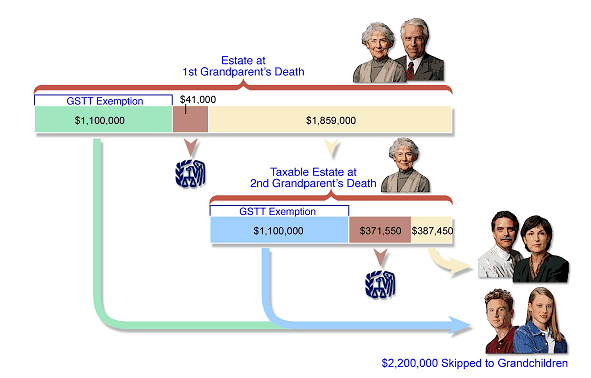| Advanced Help | Send comments on this topic. |
Glossary Item Box
Generation-Skipping Transfer Tax (or GST tax) is a tax imposed on transfers of assets to persons who are two or more generations removed from the individual making the gift. (One example would be a gift from grandparent to grandchild or great-grandchild.)
The example below assumes both deaths occur in any year after 2010.
For more information, pass your cursor over the graphic and click on an item.

The tax is in addition to any estate taxes that may be due on the property in question. The tax rate is equal to the maximum federal estate tax rate in effect. Gifts qualifying for the annual exclusion are also exempt, but special rules apply to transfers to trusts. The tax is payable by the donor, estate or trustee of the trust making the distribution. The tax is payable at the time of the transfer. GST taxes plus estate taxes could potentially equal more than 100% of the assets in question.
Putting assets into a trust and then having the trust later distribute the assets will not avoid the tax; distributions or terminations of a trust are considered taxable events.
If the grandchildren are the beneficiaries, GST tax applies also to an irrevocable insurance trust unless a gift tax return is filed each time a gift is made to the trust.
| See Also |
GSTT Using Lifetime Gifts (Definition) | GSTT Using Bequests (Illustration) | GSTT Using Bequests (Definition) | Synopsis of IRS Publication 448 | Generation-Skipping Transfer Tax (Definition) | GSTT Using Lifetime Gifts (Illustration)
© 2006 Impact Technologies Group, Inc. All Rights Reserved.